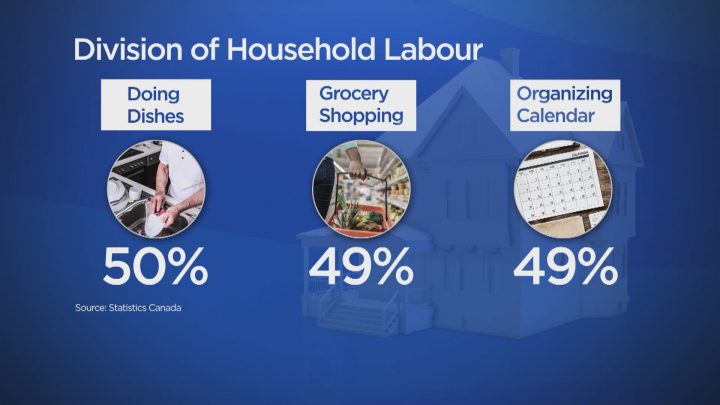At the Holloway house, the daily chores are split fairly evenly. Mom Eva, who works part time as a teacher, handles grocery shopping, laundry and meal preparation. Dad Adam, who works full time for the government of Alberta, does the dishes, yard work and weekend cooking.

“Probably my wife does a bit more in all honesty. But that’s just the way it’s set up with our working schedule,” Adam Holloway explained. “I would be more inclined to fix something in the garden or mow the lawn and she would be more inclined to do the kids’ clothes and things like that.
“It’s not like we’ve made an active decision, it just kind of fell that way.”
READ MORE: Progress? Dads pick up a half hour of daily chores over 30 years: StatsCan study
According to Statistics Canada, the division of labour in Canadian households is falling more evenly down the middle compared to past generations.
Its 2017 survey included married and common-law couples aged 20 years old or older.
About 50 per cent of respondents reported an even split between men and women when it came to doing dishes, grocery shopping and organizing the family’s social calendar. However, more people reported women handled the laundry and meal preparation and more men tackled yard work.
- Calgary’s termination of Green Line adds extra frustration for expropriated Eau Claire residents
- Calgary police searching for sexual assault suspect after attack at swimming hole
- Home ownership feels out of reach for many in Calgary
- Kananaskis council planning fireguards to protect from wildfire threat
CEO for The Vanier Institute of the Family Nora Spinks says overall, there’s been a general shift towards splitting household chores.

Get breaking National news
“Household tasks and the way in which those tasks are divided is more based on interests and availability than by gender.”
She says the the benefits of sharing the workload extend far beyond having squeaky clean counter tops and clean, folded laundry.
READ MORE: How you divide household chores can determine how happy you are in your relationship
“What the research shows is when there is more sharing in the household — both in household tasks and household management — as well as caring for children and providing elder care, there’s less stress and strain on one person and they don’t feel like they’re carrying a disproportionate part of the load and there’s less pressure on the relationship as a result.”
Statistics Canada reports it did not include same sex couples in the survey, due to the nature of the comparison.











Comments